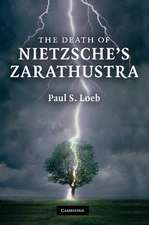Images of Anarchy: The Rhetoric and Science in Hobbes's State of Nature
Autor Ioannis D. Evrigenisen Limba Engleză Paperback – 27 apr 2016
| Toate formatele și edițiile | Preț | Express |
|---|---|---|
| Paperback (1) | 279.90 lei 6-8 săpt. | |
| Cambridge University Press – 27 apr 2016 | 279.90 lei 6-8 săpt. | |
| Hardback (1) | 699.54 lei 6-8 săpt. | |
| Cambridge University Press – 13 iul 2014 | 699.54 lei 6-8 săpt. |
Preț: 279.90 lei
Nou
Puncte Express: 420
Preț estimativ în valută:
53.57€ • 56.35$ • 44.70£
53.57€ • 56.35$ • 44.70£
Carte tipărită la comandă
Livrare economică 09-23 ianuarie 25
Preluare comenzi: 021 569.72.76
Specificații
ISBN-13: 9781316608005
ISBN-10: 131660800X
Pagini: 312
Ilustrații: 14 b/w illus.
Dimensiuni: 153 x 230 x 19 mm
Greutate: 0.46 kg
Editura: Cambridge University Press
Colecția Cambridge University Press
Locul publicării:New York, United States
ISBN-10: 131660800X
Pagini: 312
Ilustrații: 14 b/w illus.
Dimensiuni: 153 x 230 x 19 mm
Greutate: 0.46 kg
Editura: Cambridge University Press
Colecția Cambridge University Press
Locul publicării:New York, United States
Cuprins
Prologue; Part I. A Græcian: 1. Politic historiography; 2. Winning belief in the hearer; Part II. A Devotion to Peace: 3. Unobjectionable foundations: the elements of law, natural and politic; 4. The birth of civil philosophy: De Cive; 5. Reason of state: Leviathan; Part III. Images 'Historical or Fabulous': 6. Lapse and relapse, or, the first rebellion; 7. Another scripture; 8. America; Part IV. A Science of Rhetoric: 9. All things to all people; Epilogue.
Recenzii
'[Evrigenis'] command of the relevant texts and of their scholarly interpretations is unsurpassed, and he engages with both in subtle ways … [His] book, complemented by fourteen full-page illustrations, is the best sustained treatment of Hobbes' concept of the state of nature and will be essential reading for Hobbes scholars, who will find his reasoning and conclusions challenging and thought-provoking.' A. P. Martinich, The American Historical Review
'[Evrigenis'] book is organised in four parts, and every part is a source of insightful observations and comments that can stimulate the imagination of the historian, the philosopher, the political theorist, the expert of English literature, the established academic as well as the young undergraduate. The analysis is inventive, authoritative, and inspiring.' Gabriella Slomp, The Seventeenth Century
'Written with exemplary historical competence, stylistic finesse, and interpretative elegance, the book will appeal to a wide academic audience - political scientists, political philosophers, sociologists, and historians.' Severin V. Kitanov, Sixteenth Century Journal
'… bold, illuminating, and [a] scrupulously documented book … this is a serious, erudite, and comprehensive book that tackles the puzzles of Hobbes's political theory with sensitivity and originality. It will repay careful study not only by Hobbes scholars but all those interested in rhetoric, early modern political thought, and the reception of antiquity in the seventeenth century.' Richard Boyd, The Review of Politics
'[Evrigenis'] book is organised in four parts, and every part is a source of insightful observations and comments that can stimulate the imagination of the historian, the philosopher, the political theorist, the expert of English literature, the established academic as well as the young undergraduate. The analysis is inventive, authoritative, and inspiring.' Gabriella Slomp, The Seventeenth Century
'Written with exemplary historical competence, stylistic finesse, and interpretative elegance, the book will appeal to a wide academic audience - political scientists, political philosophers, sociologists, and historians.' Severin V. Kitanov, Sixteenth Century Journal
'… bold, illuminating, and [a] scrupulously documented book … this is a serious, erudite, and comprehensive book that tackles the puzzles of Hobbes's political theory with sensitivity and originality. It will repay careful study not only by Hobbes scholars but all those interested in rhetoric, early modern political thought, and the reception of antiquity in the seventeenth century.' Richard Boyd, The Review of Politics
Notă biografică
Descriere
This book examines the development of the natural condition of mankind throughout Hobbes's works and traces its origins in his sources of inspiration.













